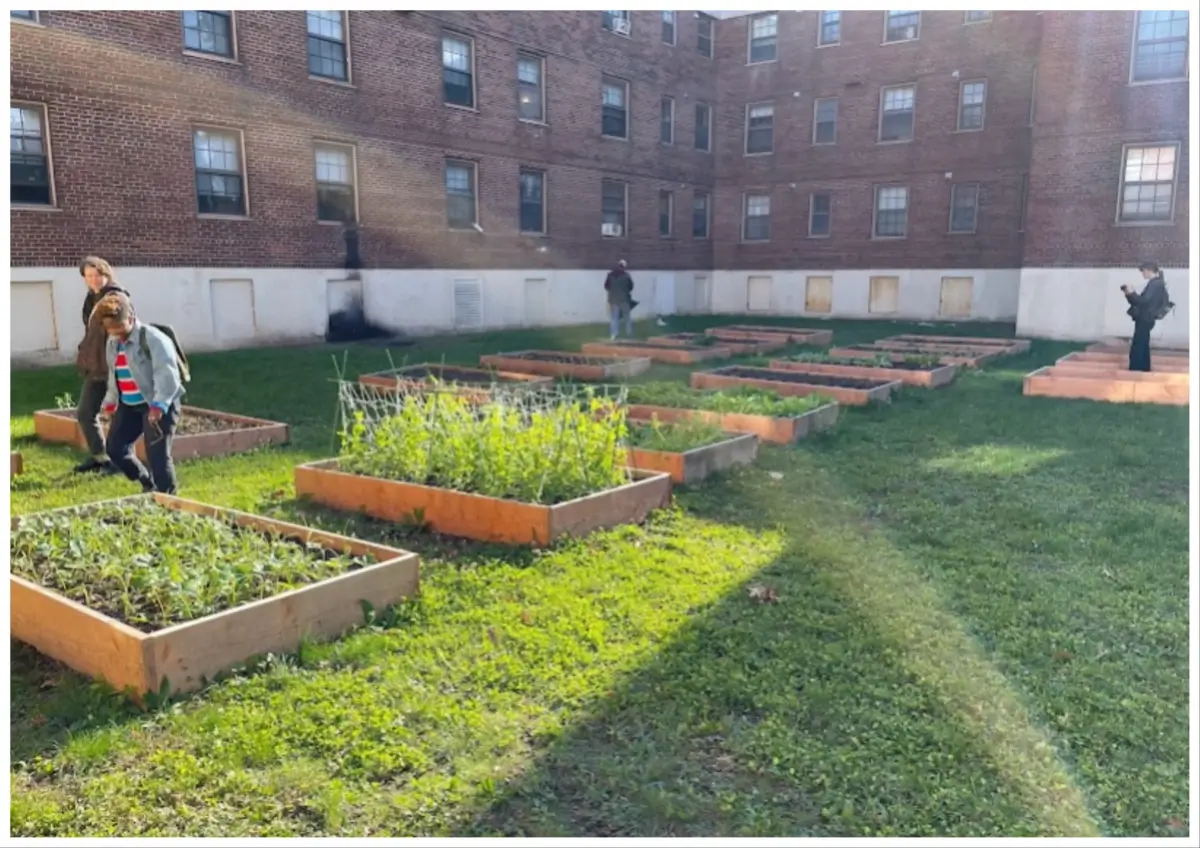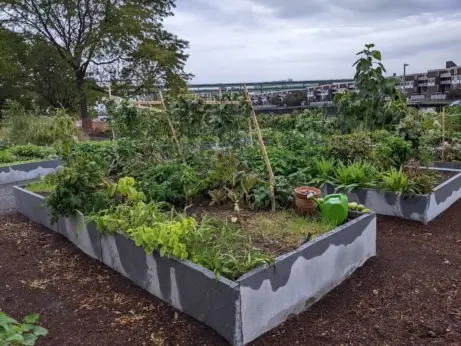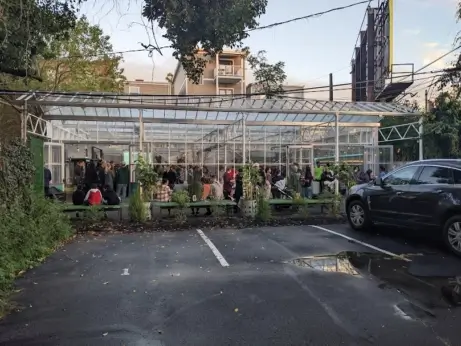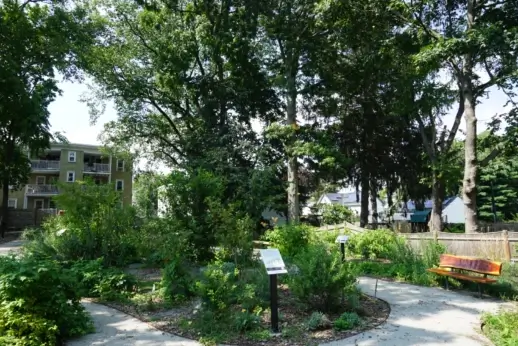On the Ground With Local Governments Prioritizing Urban Ag.
More and more cities are creating positions in local government for directors of urban agriculture.
On the Ground With Local Governments Prioritizing Urban Ag.
More and more cities are creating positions in local government for directors of urban agriculture.

Gardens at Mary Ellen McCormack public housing development.courtesy of the City of Boston.
On a September day in 2023, community members gathered at the Keep Growing Detroit Farm to witness the formal announcement of the city’s first director of urban agriculture. Tepfirah Rushdan, who had long been involved in Detroit’s farming scene as a farmer, educator and advocate, was a natural fit for the position.
Detroit Mayor Mike Duggan spoke first. He touched on the importance of having representation for urban agriculture within city government. “I felt like I was supportive of farming, but our bureaucracy wasn’t supportive,” he said in the announcement.
And then Rushdan moved in front of the microphone, to the sound of loud cheering.
By appointing Rushdan, Detroit joined a small handful of cities that are creating positions within city government for urban agriculture. Urban farming is known for connecting city dwellers with their food source, increasing food security and creating beautiful green spaces. Although urban agriculture has deep roots in many cities, these directors are giving city food spaces an institutional voice within the government, complementing the agency and advocacy that has long accompanied the practice.
“It really shows that community that they’re valuable to the city, because they have an advocate at that level,” Rushdan said later to Modern Farmer.
Detroit, Michigan
Mayor Duggan’s proposed Land Value Tax Plan, on which Detroit may get to vote in 2024, would cut property taxes on structures such as houses while dramatically increasing the taxes for vacant lots. The idea is to reduce taxes for homeowners, without losing tax revenue for the city and simultaneously encouraging owners of vacant land to develop it. But the initial plans also created a problem: Urban farmers were caught in the middle, potentially facing big tax burdens if the plan was passed.
Urban farmers began meeting with Duggan to discuss the issue, leading to an exemption for urban farms under the proposed tax increases. Another byproduct of these meetings was the realization by the city that they needed the voices of urban farmers represented in government. Shortly after, Rushdan’s position was created.
In her speech at the ceremony, Rushdan made sure to acknowledge that while she’s the first in this position, she stands on the shoulders of giants in the Detroit agriculture scene. She referenced multiple local leaders who had helped build and expand urban agriculture in Detroit, such as Kathryn Underwood of the City Planning Commission and Malik Yakini of the Detroit Black Community Food Sovereignty Network.
“Even though this is a new iteration… I do see this as like a little bit of a continuation of that spirit,” said Rushdan later to Modern Farmer. “I think it’s important to always uplift that history.”
Farming has a long history in Detroit, and many cities can say the same. In her position, Rushdan can help urban farmers navigate the challenges that remain—acquiring land is difficult, and finding land that has access to public water is an additional challenge. It can also be hard to compete with developers. In some cases, developers have bought up land where cultivation was taking place, and farmers lost decades of work.
“We really got aggressive over the last five years—we’re trying to figure out how to make people land secure,” says Rushdan.
But Detroit is in a unique position, because there’s a lot of vacant land. “It’s like re-imagining what a city could be with a lens of green space or the lens of sustainability,” says Rushdan.

Boston, Massachusetts
Shani Fletcher is the first director of GrowBoston, the city’s office of urban agriculture. In 2013, Boston adopted Article 89, which brought urban agriculture into the city zoning code. But there weren’t a lot of city programs to move urban farming initiatives forward.
“We just saw this need for more kinds of programming and more kinds of investments beyond capital investments,” says Fletcher. In response, the mayor created GrowBoston, and Fletcher, whose career was driven by food justice, was appointed to the helm.
Part of Fletcher’s work at GrowBoston is to meet with other city departments that have an impact on urban agriculture—Public Health, Water and Sewer, Parks and Recreation and many more—which is part of why having a voice for urban agriculture in city government is so important.
“Because of just the nature of urban agriculture, there’s so many departments that can have an impact on it, in a positive or negative way,” says Fletcher. “And so I think having an office and some staff who are actually focused on addressing the whole of urban agriculture and can kind of work with other departments to strategize is really a big benefit.”
The fact that urban agriculture is influenced by multiple departments is evidenced by the fact that in the cities that have an office for urban agriculture, it is housed in different departments. Boston’s is in Housing. DC’s is in Energy & Environment. Atlanta, City Planning. Philadelphia, Parks and Recreation.
As in Detroit, accessing land for urban agriculture and the upfront costs associated with making land suitable for farming is a significant obstacle in Boston. Fletcher says for people looking to begin urban agriculture in cities facing similar access issues, creatively engaging with others about how to use existing space is a good way to begin. This could be connecting with public officials or private landowners or rethinking what garden space can be.
“I really get excited thinking about growing food in weird places,” says Fletcher, such as vertically, on rooftops or in other creative spaces. “I like the idea of it just being kind of everywhere you go, there could be food growing, and that that’s being eaten, and that’s getting to people who need it.”

Washington, DC and beyond
Kate Lee became the director of the Office of Urban Agriculture in Washington, DC in March 2020, but the need for her position arose several years earlier. In 2014, the District passed an environmental sustainability plan called Sustainable DC. One goal of this plan was to increase the amount of land under cultivation in the District by 20 acres. Urban agriculturists wanted to step to the plate, but they hit a common barrier—how to access land for this purpose?
“The community advocated more and more vocally that we need a position embedded in this government, we need someone with know-how to run these programs to liaise between the government and the stakeholders,” says Lee.
In response, DC passed legislation in 2019 to create the Office of Urban Agriculture and Lee’s position.
DC is and has been gentrifying rapidly, and there’s a lot of value in supporting long-term residents of the District, says Lee. “The office is driven by community ownership, food sovereignty and self-determination … using our resources and our opportunity to advocate for self-determination.”
Although some of the cities with official urban agriculture positions might look far apart on a map, they don’t exist in silos. The directors have self-organized into a group that meets regularly and shares ideas and feedback with each other. The name of the group, of which Lee and Fletcher are co-chairs, is the Urban Agriculture Directors Network (part of the Urban Sustainability Directors Network), but you don’t actually have to be a director to join, as long as you’re a municipal government employee influencing urban agriculture in your area. Four years after its inception, this cohort now includes about 20 different municipalities. In the meetings, participants share best practices, support and coach each other and even celebrate victories, such as the creation of a new urban agriculture liaison in New Orleans.
“Our three cities [DC, Boston and Austin, Texas] wrote to the mayor of New Orleans [and] said, ‘Based on this position, please join this echelon of other cities leading in this work,’” says Lee. “And they did. New Orleans just funded an urban agriculture liaison position. And so that is the type of stuff that is really keeping me going.”

Are you thinking about getting started in urban agriculture?: Look into local ordinances so that you can stay safe from accidentally breaking the law. Make connections with your neighbors and let them know what you’re doing. If your city doesn’t have an office of agriculture (yet), Rushdan says: “Find some advocates within the city. In a city that doesn’t have any office of agriculture that you can turn to, you [have] to find those advocates within the departments that believe in what you’re doing, so that they can figure out the internal systems.”
Fletcher echoes the sentiment of building connections with others who are engaged in urban agriculture. “I think there’s so much about urban agriculture that is about building community. And I think if someone’s interested in getting involved in urban agriculture, looking around your community and seeing who’s doing that already is a really good starting point.”
Are you a local government employee with some influence on urban agriculture in your area? Reach out to the Urban Agriculture Directors Network. The network meets regularly and is a good space for education and collaboration.
Follow us

This work is licensed under a Creative Commons Attribution-NoDerivatives 4.0 International License.
Want to republish a Modern Farmer story?
We are happy for Modern Farmer stories to be shared, and encourage you to republish our articles for your audience. When doing so, we ask that you follow these guidelines:
Please credit us and our writers
For the author byline, please use “Author Name, Modern Farmer.” At the top of our stories, if on the web, please include this text and link: “This story was originally published by Modern Farmer.”
Please make sure to include a link back to either our home page or the article URL.
At the bottom of the story, please include the following text:
“Modern Farmer is a nonprofit initiative dedicated to raising awareness and catalyzing action at the intersection of food, agriculture, and society. Read more at <link>Modern Farmer</link>.”
Use our widget
We’d like to be able to track our stories, so we ask that if you republish our content, you do so using our widget (located on the left hand side of the article). The HTML code has a built-in tracker that tells us the data and domain where the story was published, as well as view counts.
Check the image requirements
It’s your responsibility to confirm you're licensed to republish images in our articles. Some images, such as those from commercial providers, don't allow their images to be republished without permission or payment. Copyright terms are generally listed in the image caption and attribution. You are welcome to omit our images or substitute with your own. Charts and interactive graphics follow the same rules.
Don’t change too much. Or, ask us first.
Articles must be republished in their entirety. It’s okay to change references to time (“today” to “yesterday”) or location (“Iowa City, IA” to “here”). But please keep everything else the same.
If you feel strongly that a more material edit needs to be made, get in touch with us at [email protected]. We’re happy to discuss it with the original author, but we must have prior approval for changes before publication.
Special cases
Extracts. You may run the first few lines or paragraphs of the article and then say: “Read the full article at Modern Farmer” with a link back to the original article.
Quotes. You may quote authors provided you include a link back to the article URL.
Translations. These require writer approval. To inquire about translation of a Modern Farmer article, contact us at [email protected]
Signed consent / copyright release forms. These are not required, provided you are following these guidelines.
Print. Articles can be republished in print under these same rules, with the exception that you do not need to include the links.
Tag us
When sharing the story on social media, please tag us using the following: - Twitter (@ModFarm) - Facebook (@ModernFarmerMedia) - Instagram (@modfarm)
Use our content respectfully
Modern Farmer is a nonprofit and as such we share our content for free and in good faith in order to reach new audiences. Respectfully,
No selling ads against our stories. It’s okay to put our stories on pages with ads.
Don’t republish our material wholesale, or automatically; you need to select stories to be republished individually.
You have no rights to sell, license, syndicate, or otherwise represent yourself as the authorized owner of our material to any third parties. This means that you cannot actively publish or submit our work for syndication to third party platforms or apps like Apple News or Google News. We understand that publishers cannot fully control when certain third parties automatically summarize or crawl content from publishers’ own sites.
Keep in touch
We want to hear from you if you love Modern Farmer content, have a collaboration idea, or anything else to share. As a nonprofit outlet, we work in service of our community and are always open to comments, feedback, and ideas. Contact us at [email protected].by Lena Beck, Modern Farmer
February 8, 2024
Modern Farmer Weekly
Solutions Hub
Innovations, ideas and inspiration. Actionable solutions for a resilient food system.
ExploreExplore other topics
Share With Us
We want to hear from Modern Farmer readers who have thoughtful commentary, actionable solutions, or helpful ideas to share.
SubmitNecessary cookies are absolutely essential for the website to function properly. This category only includes cookies that ensures basic functionalities and security features of the website. These cookies do not store any personal information.
Any cookies that may not be particularly necessary for the website to function and are used specifically to collect user personal data via analytics, ads, other embedded contents are termed as non-necessary cookies.
Beautiful just Beautiful!
I never knew about this information! very useful information